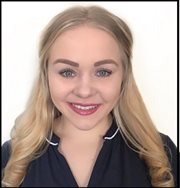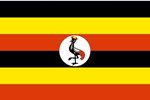Marissa Nahirney
 Born and raised in Alberta, Canada, Marissa Nahirney is a second-year medical student at the University of Alberta and graduated with a BHSc (Hons) in Health and Society from the University of Calgary in 2018. Her keen interest in maternal health led her to conduct several research projects and an honors thesis evaluating obstetrical and neonatal health outcomes and improvements in Canada and internationally. She was honored to receive the opportunity to learn about tropical medicine and global health principles by participating in a field school in rural Tanzania, where she studied gendered perspectives on water and sanitation issues among Maasai women. After this experience, Marissa aimed to marry her interests in tropical medicine, equity and maternal health. She was awarded the Queen Elizabeth Golden Jubilee Scholarship in 2018 to intern in Mbarara, Uganda, developing community-level initiatives to improve maternal health with Healthy Child Uganda, and garnering support from USAID and Wellcome Trust. Outside of her field activities, Marissa enjoys taking local action on global issues. She co-founded the Calgary chapter of the Canadian Coalition for Global Health Research and now serves as the University of Alberta’s global health liaison to the Canadian Federation of Medical Students and the UofA’s Medical Student’s Association Vice-President Community Engagement. Through these roles, she collaborates with faculty and students to improve global health equity education in the curriculum and develop student opportunities for responsible global and local engagement. Outside of medicine, Marissa loves performing with her Ukrainian dance company, running and trying international cuisine.
Born and raised in Alberta, Canada, Marissa Nahirney is a second-year medical student at the University of Alberta and graduated with a BHSc (Hons) in Health and Society from the University of Calgary in 2018. Her keen interest in maternal health led her to conduct several research projects and an honors thesis evaluating obstetrical and neonatal health outcomes and improvements in Canada and internationally. She was honored to receive the opportunity to learn about tropical medicine and global health principles by participating in a field school in rural Tanzania, where she studied gendered perspectives on water and sanitation issues among Maasai women. After this experience, Marissa aimed to marry her interests in tropical medicine, equity and maternal health. She was awarded the Queen Elizabeth Golden Jubilee Scholarship in 2018 to intern in Mbarara, Uganda, developing community-level initiatives to improve maternal health with Healthy Child Uganda, and garnering support from USAID and Wellcome Trust. Outside of her field activities, Marissa enjoys taking local action on global issues. She co-founded the Calgary chapter of the Canadian Coalition for Global Health Research and now serves as the University of Alberta’s global health liaison to the Canadian Federation of Medical Students and the UofA’s Medical Student’s Association Vice-President Community Engagement. Through these roles, she collaborates with faculty and students to improve global health equity education in the curriculum and develop student opportunities for responsible global and local engagement. Outside of medicine, Marissa loves performing with her Ukrainian dance company, running and trying international cuisine.

Clinical Presentation, Treatment, Prevention and Epidemiology of Malaria in an Endemic Country
7/15/2019 - 8/16/2019
Uganda
What does the Kean Fellowship mean to you?
Not only is this an incredible professional and personal honor, but the Kean Fellowship solidifies my desire to contribute to international health equity and build off of my past experiences to become well-equipped for a career in tropical medicine. This fellowship will support my hands-on clinical learning and encourage my participation in sustained ethical global health involvement. It is exciting to have this opportunity to weave global health research and clinical exposure in my early medical training, and to be accepted into this inspiring ASTMH community of other impassioned and articulate fellowship recipients.
What do you anticipate learning?
I have yet to experience global health training through a clinical lens and thus I am truly excited about meaningful engagement with the communities I aim to work within as a future clinician. I anticipate that learning at a referral center in Uganda will be particularly challenging as I encounter issues with resource availability, complex cases, structural factors implicating patient care and new dynamics with care providers and patients. I foresee that this opportunity will allow me to consider the role for resource stewardship among care providers in high-resource settings while considering the importance of structural change within communities for the prevention and treatment of infectious disease in low-resource settings.
What interests you about tropical medicine and what problems are you interested in solving?
Tropical medicine fascinates me because of the crucial intersection of pathophysiology, the economics and politics of poverty, and the role for policy alongside “shoe-leather epidemiology” – the collection of data on disease prevalence through direct community engagement. I appreciate how sustainable approaches to tropical transmission require an understanding of local context that impacts the burden of illness. While interning in Southwestern Uganda, I recognized how Community Health Workers (CHW) were the key to encouraging appropriate antenatal care. The CHW program was considered culturally appropriate, sustainable and health-promoting even among the most vulnerable members of these communities. In understanding how CHWs manage health through a culturally relevant lens, I am interested to apply similar approaches to evaluating tropical disease management in other settings. Effective treatment and prevention rely on system-level factors that trickle down to the individual level. I am motivated to learn how structural change, in addition to social entrepreneurship and community education, can reduce the burden of tropical disease for vulnerable populations, especially mothers and women of reproductive age.